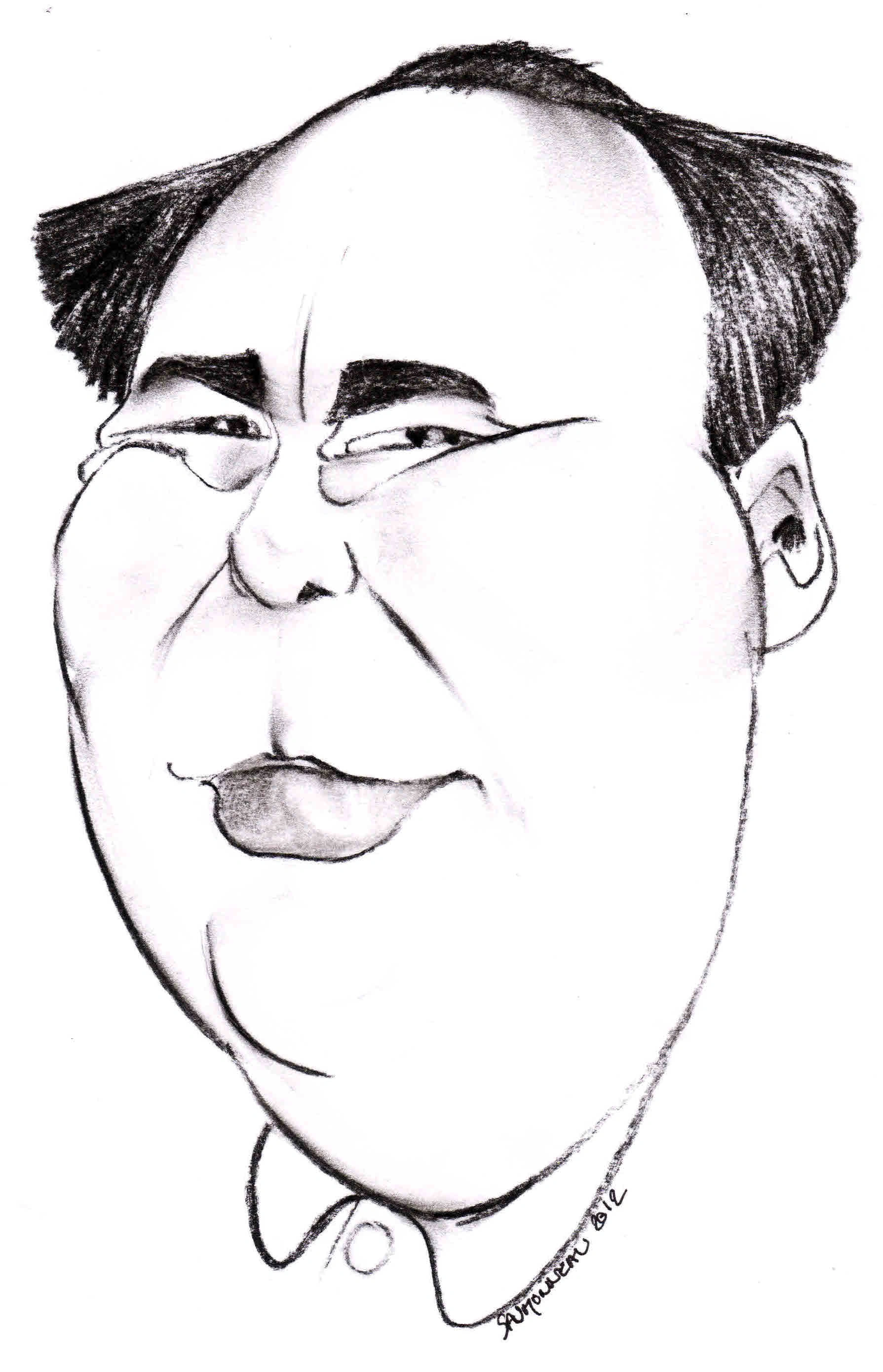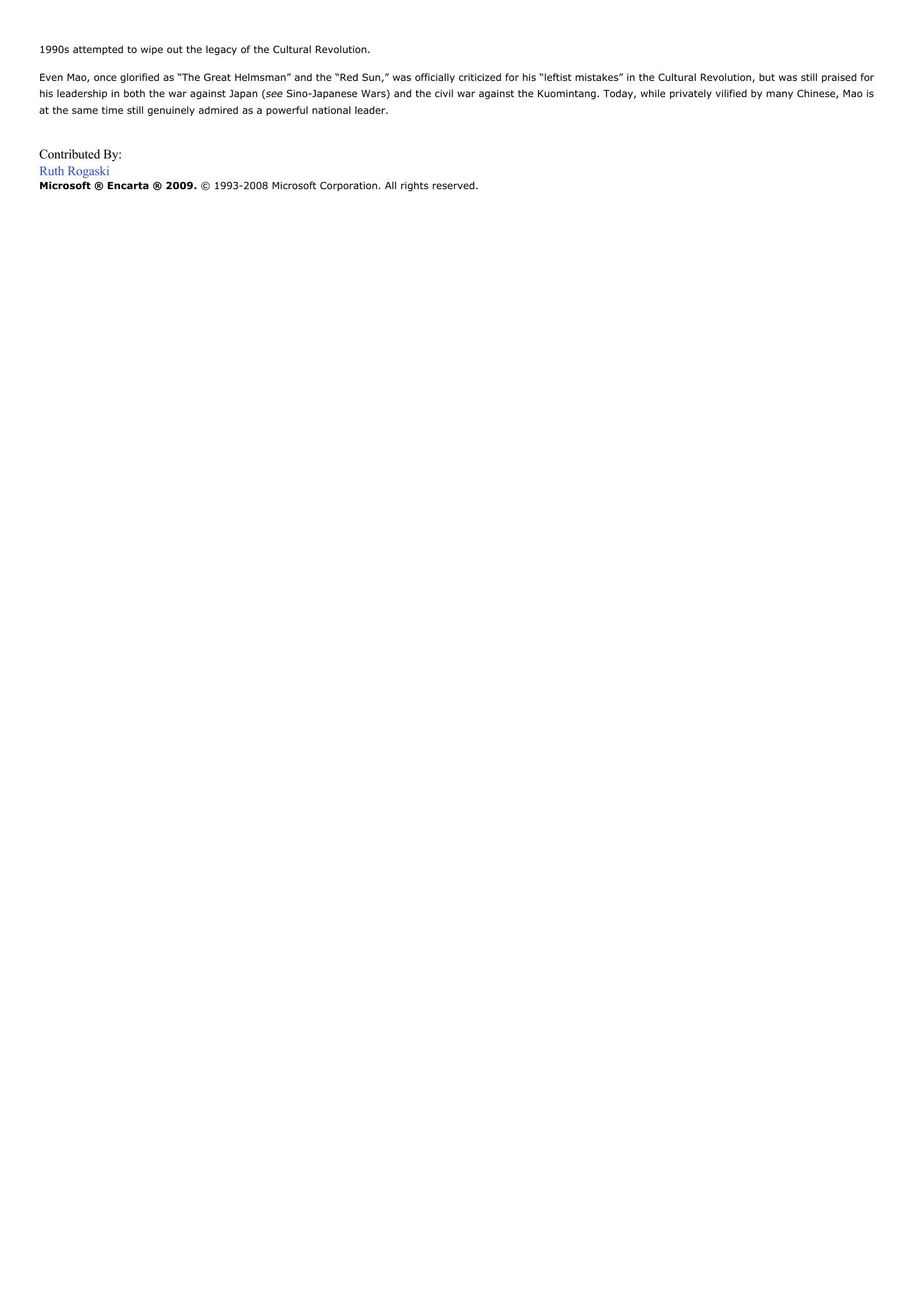
Cultural Revolution I INTRODUCTION Cultural Revolution (1966-1976), political campaign in China, launched in 1966 by Chinese Communist Party chairman Mao Zedong to eliminate his political rivals and revolutionize Chinese society. In the social chaos and political persecution that followed, thousands died and millions were imprisoned or exiled. II POLITICAL CLIMATE PRECEDING THE CULTURAL REVOLUTION In 1960 after the failure of the Great Leap Forward, Mao's radical economic and social program, moderates in the Communist leadership such as Liu Shaoqi and Deng Xiaoping began implementing more gradual approaches to economic development and social organization. Mao, meanwhile, believed the goals of Communist revolution had not been realized since 1949, when the Communists defeated the Kuomintang and gained control of mainland China . Not only was the gap still great between the standard of living in the city and countryside, but intellectuals and professionals still retained privileges in education and an entrenched bureaucracy still controlled China. Frustrated with the slowness of social change, Mao sought an opportunity to attack the moderates. Mao's wife Jiang Qing and her associates, who became known as the Gang of Four, defended Mao's policies. The first attack was an article written in November 1965 by Mao's supporter Yao Wenyuan. Yao criticized Hai Rui ba guan (The Dismissal of Hai Rui from Office, 1961), a play written by the historian Wu Han. Although it was set in the Ming dynasty (1368-1644), the play was actually a veiled criticism of the Great Leap Forward and Mao's dismissal of Defense Minister Peng Dehuai, who had criticized the program and argued for more moderate policies. In February 1966 Jiang Qing proclaimed Wu Han's play a "reactionary poisonous weed," and called for attacks on other cultural works that criticized Mao's policies. Nie Yuanzi, the Communist Party secretary of the philosophy department at China's prestigious Beijing University, fired another opening shot of the Cultural Revolution when she displayed a poster warning that the university was controlled by the bourgeoisie, or elite. The poster called for an all-out attack against elitist forces. By Mao's order, the poster was read over national radio on June 1, 1966. Mao also authorized editorials in the Communist Party newspaper to denounce the bourgeois elements in society. By doing this, he formally proclaimed the beginning of the Cultural Revolution, though few at the time understood that it would lead to ten years of chaos and violence. III PERSECUTION AND DESTRUCTION In response to Mao's call, high school students in Beijing began forming groups called the Red Guards. Mao signaled his approval of these groups, and high school and university students around the country quickly formed other bands of Red Guards. These students began to criticize teachers, school administrators, and government leaders. Mao himself received millions of Red Guards in a mass review at Beijing's Tiananmen Square on August 18, 1966. Schools were ordered closed and students from all over the country traveled to Beijing for the chance to see Mao, who was worshiped by many as a godlike hero. Schools and universities remained closed from 1966 to 1969. Mao appealed to the students to "smash the four olds": old ideas, old culture, old customs, and old habits. Chaos ensued as Red Guards destroyed temples, artwork, books, and anything associated with traditional or foreign cultures. Radical leaders and Red Guards also persecuted artists, writers, and those with foreign connections. Victims were subjected to public criticism, humiliation, and physical abuse in meetings known as struggle sessions. Intellectuals such as the writer Lao She and the historian Wu Han were among the thousands of victims who committed suicide or who died from Red Guard abuse. Many others were imprisoned or forced to do menial labor. Moderate government officials were also targets of attacks by radicals. Liu Shaoqi, who was then China's president and Mao's chosen successor, was the most prominent moderate. For his pragmatic policies, Liu was accused of being "China's number one capitalist roader" and a traitor to Chairman Mao. He died in prison in 1969. Those associated with Liu's policies, such as Deng Xiaoping, were removed from their government positions and imprisoned or exiled. Military leader Lin Biao, a supporter of Mao's Cultural Revolution policies, was named Mao's successor in 1969. IV DOWN TO THE COUNTRYSIDE In 1967, amidst the anarchy of the Red Guard activities and fighting between rival Red Guard groups, China's military, the People's Liberation Army (PLA), was called in to restore order. From 1967 to 1969 thousands died in violent clashes between Red Guard factions, and between the Red Guards and the military. In an attempt to rein in the chaos, Mao and his supporters placed most government organizations under the control of the PLA and launched a new phase of the Cultural Revolution, the "Campaign to Purify Class Ranks." Beginning in 1969 urban government officials and intellectuals were sent to the countryside to do hard labor and to study Mao's works. Many urban youths from age 16 to age 19 were dispersed to the countryside where they were instructed to learn from the peasants. Family members were often split up and forced to live in harsh conditions thousands of miles from one another. Unable to receive permission to return, many youths remained in the countryside for years. Throughout the early 1970s Mao continued his goal of reducing the economic gap between the city and the countryside. The children of urban elite lived and worked among rural peasants. The children of peasants, workers, and soldiers attended the reopened schools where they studied the works of Mao and the accomplishments of peasants. Thousands of students received rudimentary medical training and went to the countryside as so-called barefoot doctors; they provided basic health care to peasants who otherwise had no access to medical facilities. Urban culture was replaced by new revolutionary ballet, opera, and literature, much of it produced under the patronage of Jiang Qing. The new work expressed the struggles of the peasants and glorified Chairman Mao. While most of the radical excesses of the Cultural Revolution had diminished by the mid-1970s, some of its rhetoric and policies continued even after Mao's death in 1976. Jiang Qing and the rest of the Gang of Four were arrested that year. Their arrest was declared the official end of the movement, but it was not until 1981 that the Gang of Four were convicted for their crimes and the Communist Party leadership under Deng Xiaoping officially condemned the Cultural Revolution. V CONSEQUENCES The Cultural Revolution had far-reaching impacts on all aspects of Chinese society. The years of chaos from 1966 to 1969 saw the slowdown and partial collapse of the Chinese economy. Rural markets were forbidden and peasants were forced to sell all produce to the state. The possibility for economic cooperation with the West was eliminated by China's emphasis on self-reliance above all else, as well as by its xenophobia, the fear of foreigners and foreign ways. This caused economic isolation and stagnation. In contrast, during the same period the economies of Japan, Taiwan, and South Korea soared. Education suffered serious setbacks. An entire generation of young people had their education disrupted while they "made revolution" for Chairman Mao. College entrance exams, suspended in 1966, were not reinstated until 1977. During the Cultural Revolution many valuable books and collections were destroyed and many scholars at China's leading schools died from abuse by the Red Guards. The Chinese Communist Party (CCP) lost much of its prestige as a result of the Cultural Revolution. People at all levels of society were disillusioned by the high-level power struggles and the instability of party policy. But the CCP remained tenaciously in control, in part because Deng Xiaoping's economic reforms of the 1980s and 1990s attempted to wipe out the legacy of the Cultural Revolution. Even Mao, once glorified as "The Great Helmsman" and the "Red Sun," was officially criticized for his "leftist mistakes" in the Cultural Revolution, but was still praised for his leadership in both the war against Japan (see Sino-Japanese Wars) and the civil war against the Kuomintang. Today, while privately vilified by many Chinese, Mao is at the same time still genuinely admired as a powerful national leader. Contributed By: Ruth Rogaski Microsoft ® Encarta ® 2009. © 1993-2008 Microsoft Corporation. All rights reserved.



































